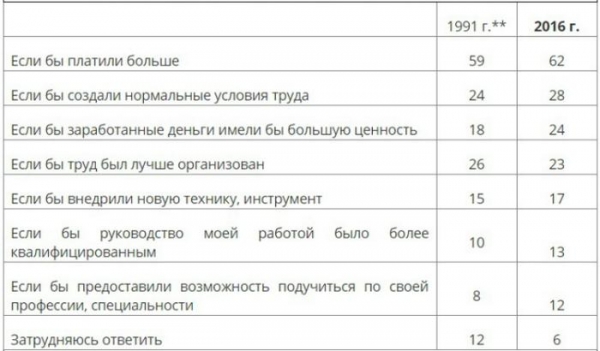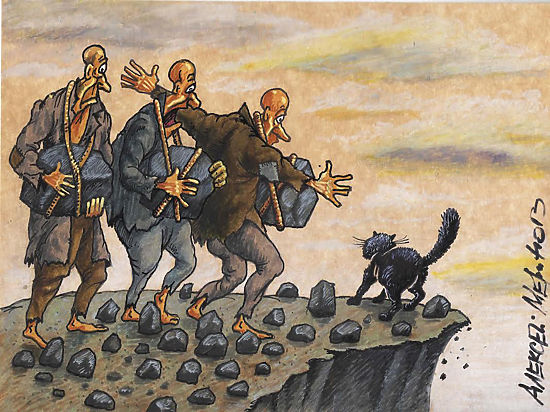 TriviaKing, 2009
TriviaKing, 2009
For 25 years, the share of Russians who consider work as an unpleasant necessity, doubled. A decrease in the purchasing power of wages is perceived as a reason to reduce the labor enthusiasm.
All-Russia centre of studying of public opinion (VTSIOM) presented survey data on the change in attitude to work in our country over the past 25 years. The main result of the survey is rather predictable: the Russians consider the labor case, which must be paid for, and the more, the better will be the efforts.
The work is a “necessary evil”, to which, however, each applies in its own way, “Work is not a wolf” and to “easily not pull the fish from the pond”, — commented the results of the survey http://davydov-index.livejournal.com/profile” target=”_self” rel=”nofollow”> http://davydov-index.livejournal.com/” target=”_self” rel=”nofollow”>davydov_index:
http://davydov-index.livejournal.com/” target=”_self” rel=”nofollow”>davydov_index:
It turned out, those who, if possible, completely ceased to work, not so much — only 14%. However, it is twice more than a quarter of a century ago. At the same time in different age groups the proportion of such refusals varies: among young people (18 to 24 years), their less — 5%, to 44 years for 12%, and among 60-year — 35%. Even more interesting is the distribution of the answers depending on the material situation: among the wealthy to refuse to work theoretically ready 8%, and among those who are income poor — 18%. Tellingly, a source of money work called fewer survey participants than in 91-m to year 45% vs 50%.
 “What is work?” VTSIOM, 2016
“What is work?” VTSIOM, 2016
The proportion of those who believe that work should not interfere with the rest of life fell from 32% in 1991 to 24% in 2016. By age the answers were distributed in an inverse relationship: youth (18-24) — 34%, average age (35-44) — 23% 60 years or more — 11%.
Among the factors that can affect the improvement of quality of work, confident leader salary: 62% are ready to work better, if it will increase. Also important for the Russians working conditions, work organization, quality security equipment, inservice training and other aspects.
 “Under what conditions would You work better than now?” VTSIOM, 2016
“Under what conditions would You work better than now?” VTSIOM, 2016
Paradoxically, the fact: for the past 25 years much has changed, the political and social system, economy, life circumstances. While the attitude of our people — then Soviet, now Russian — the work as a whole has not changed. Yes, there is a slight shift in priorities, but the General background it is not so critical.
The higher the inflation, the worse work
Sociologists put emphasis on the important point: for a growing number of Russians the most important factor of labor enthusiasm is not the wage level per se, but its real purchasing power: 24% of respondents said that if money earned had more value, and they would work better (in 1991 the answer was chosen by only 18%). “They reason that if the same work I started to live worse, and I should moderate labor enthusiasm” — explain specialists. — It turns out that employers pretend to pay and the workers pretend to work”.
At the same time Russians are ready to sacrifice much for the sake of the work, which pays well. As the results of a study conducted by staffing Agency Kelly Services, the Russians more than their counterparts in other countries are willing to sacrifice their personal time in favor of the interests of the employer.
 The balance of work and personal life as an attribute of an attractive employer (by countries,%). Kelly Services, 2015
The balance of work and personal life as an attribute of an attractive employer (by countries,%). Kelly Services, 2015
These conclusions are confirmed by the results of a survey conducted by Superjob Agency, according to which 26% of Russians today was the usual situation, when at work, have to stay late almost every day. 21% of respondents remain on the job after the end of the day a few times a week, 21% several times per month. Infrequently — a few times a year — have to stay over 12% of employees. Never late service only about 14% of workers. At the same time almost every day working late have mostly Russians with a salary of 45 000 RUB. per month.







